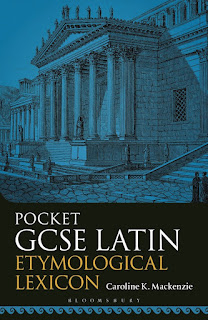Caroline K. Mackenzie discusses the concepts behind her illustrated compendium of Latin words and English derivatives
'vinum’ (wine) - vine, vinegar, vineyard, vintage
I have always been fascinated by the Latin language. It helped that I had a kind and fun teacher at school whose lessons I loved. Mrs Ruscoe inspired us to master the grammar and vocabulary and we learned to read some wonderful literature together.
Since trading a legal career for a teaching vocation, I have often reflected on those lessons and how they motivated me. This year, lockdown has changed the way I teach, which is currently via Zoom as I tutor children in Latin (and Greek) with one-to-one sessions external to their school timetables. My Classics Club (for adults) is presently also online, with the major change being that the coffee and cake (possibly the most essential ingredients for a good discussion) must now be ‘bring your own’.
However, one thing that never changes in teaching Latin is the importance of the vocabulary. Words are quite simply the building blocks of a language. Unfortunately, vocabulary is often presented in a long list - usually in black and white, crammed onto the pages in small font and is, quite understandably, not particularly appetising. So, together with my pupils, I devised a game where we would think of an English derivative from a Latin word, which would then provide a clue to the meaning of the Latin; e.g. ‘rideo’ means ‘I laugh’ or ‘I smile’, and some English derivatives are ‘deride’ or ‘ridiculous’. We soon discovered that the Latin words were easy to recall, and learning became much more efficient as well as fun.
Some derivatives may seem obvious, e.g. ‘resist’ from ‘resisto’ whereas others are more surprising, e.g. why does a ‘tandem’ bike derive from ‘tandem’ (at last)? If we translate ‘tandem’ as ‘at length’ this begins to make more sense when we think of a tandem bike (for two people) simply as a lengthened version of a one-person bike. ‘Tandem’ is often confused with ‘tamen’ (however) but by imagining a picture of a tandem bike and knowing the pun in the meaning, the distinction between the two words can easily be made.
‘tandem’ (at last, finally)
And so the book was born. The vibrant and witty illustrations, including the beautiful image of the Roman Forum on the cover, were created by Amanda Short, whose work I have long admired.
Initially, I conceived the idea as a revision aid for GCSE students: therefore, it includes some grammatical information for each word, such as the declension and gender of a noun and the conjugation of a verb. However, the book has evolved into a secret weapon for anyone tackling crosswords or word games, where the associations between Latin vocabulary and the English derivatives will spark the imagination and encourage a deluge of possible answers. There is even a Latin derivative for someone who loves crosswords: a ‘cruciverbalist’.
Choice of derivatives
Many of the Latin words I chose have ubiquitous derivatives in English and one of the most difficult aspects of writing the book was having to limit the number of derivatives per entry. The book has been designed to include plenty of space on each page for readers to add some more derivatives if they wish to do so.
The Lexicon includes a glossary of Latin words and phrases in common usage, e.g. ‘mea culpa’ and ‘prima facie’. One of the rarer ones that I could not resist including is ‘quidnunc’. Literally translated as ‘what now?’ it describes an inquisitive gossiping person. That is a derivative worth intermittently slipping into conversation, with a nonchalant air.
You may discover your name among the derivatives: Max, Miranda, Clare, Patricia, Benedict, etc. Whatever your hobbies, you are likely to find some Latin which relates to your favourite past-time: musicians will know ‘cadence’ from ‘cado’ (I fall) and anyone who uses a computer or laptop will be familiar with ‘cursor’ from ‘curro’ (I run) and ‘delete’ from ‘deleo’ (I destroy). Gardens are grown from Latin (‘gladiolus’) and nature abounds with it (‘brevipennate’); anatomy (‘vertebra’), vocations (‘horologist’), theatre (‘exeunt’) and sport (‘equestrian’) are further examples. I could go on ‘ad nauseam’…
Even the word ‘derivative’ is itself a derivative, being literally something flowing downstream (the verb ‘derivare’ means to turn into another channel or to divert from). Likewise, ‘language’ stems from ‘lingua’ (tongue) and ‘dictionary’ from ‘dico’ (I say).
As for Latin abbreviations that we use daily, you have already been translating these as you read this blog, possibly without even realising it, ‘e.g.’ or ‘exempli gratia’ (for the sake of example), ‘etc.’ or ‘et cetera’ (and the others).
October evenings
‘dormio’ (I sleep) - dormant, dormitory, dormouse
As we begin to contemplate curling up with a hot chocolate (or perhaps imbibing a glass of wine) on these cosy autumn evenings, I hope the book may become a welcome companion (a ‘vade-mecum’) providing both entertainment and intellectual challenges.
The Latin Lexicon contains just over 365 entries. Fortuitously, that provides one for each day of the year, and a couple of bonus ones for your birthday and other special occasions. Here, as my final offering, I have selected ten of my favourites to whet your appetite: like a verbal pre-prandial treat.
My Top Ten Latin Lexicon entries
(I) ambulo - I walk.
amble, ambulance (do you know why? clue: history), ambulatory, noctambulation (sleepwalking).
(II) bibo - I drink.
bib (babies dribble their drinks), bibation, bibber, imbibe.
(III) castra - camp.
‘castle’, ‘caster’, ‘cester’ and ‘chester’ in names of places in Britain, e.g. Chester, Chichester, Cirencester, Grantchester, Lancaster, Leicester, Winchester. (Perhaps your home town, too?)
(IV) gravis - heavy, serious.
grave, gravitas, gravitate, gravity.
(V) hortus - garden.
horticultural, horticulture.
(VI) laudo - I praise.
applaud, applause, laud, laudable, laudatory.
(VII) liber - book.
librarian, library.
(VIII) magnus - big, large, great.
magnificent, magnify, magniloquent (I call this a ‘double derivative’), magnitude.
(IX) nomen - name.
denomination, nomenclature, nominal, nominative (useful when learning Latin!), nominee, noun.
(X) quaero - search for, ask.
enquiry, inquiry, query, quest, question, questionnaire.
As you may have anticipated, I have incorporated numerous Latin derivatives in this blog. I contemplated highlighting them in some manner, but that would spoil the fun for those of you who like a challenge - how many can you find? (Answers on a postcard, please.)
With thanks to: all the History Girls, especially Ruth Downie, Janie Hampton, Mary Hoffman, Michelle Lovric and Celia Rees; Caroline Lawrence; Dr David Davison, Patrick Harris and Ben Heaney at Archaeopress; Amanda Short; Dr John Taylor; Professor Paul Cartledge; and Dr Daisy Dunn.
Special offer available on pre-orders of A Latin Lexicon available here:
P.S. (post scriptum.) Do tell me your favourite Latin word/derivative and any memories of learning Latin at school: I’d love to know!
Twitter @carolinetutor
All images © Amanda Short Design.










